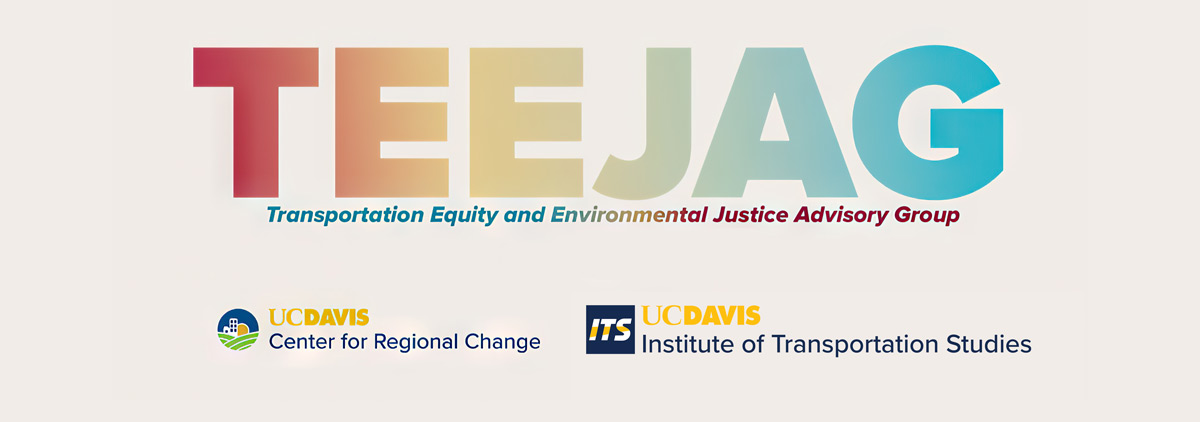Transportation Equity and Environmental Justice Advisory Group (TEEJAG)

The Transportation Equity and Environmental Justice Advisory Group (TEEJAG), is an advisory body dedicated to providing feedback on current and future research conducted by the Climate Smart Transportation and Communities Consortium (C-STACC). Funded by the Strategic Growth Council and led by the UC Davis Institute for Transportation Studies, the C-STACC is a multi-university initiative dedicated to leveraging existing knowledge on climate-smart transportation, strategically generating new research, and partnering with community based organizations, non-governmental organizations, government agencies, and the private sectors to apply this knowledge for maximum impact on public policy.
The TEEJAG includes leaders committed to social and environmental justice and reducing transportation-related greenhouse gas emissions in disadvantaged communities throughout California. It provides an open and ongoing forum for generating ideas, providing guidance on current and future research projects, sharing and discussing implications of research results, identifying future research needs, and developing best practices and policy strategies that put research findings into action. The TEEJAG, in partnership with C-STACC researchers, will identify solutions that are co-developed, evaluated and implemented with regional, city and county leaders, and community members. The TEEJAG will also produce environmental justice research guidelines to ensure that C-STACC research is conducted in a way that honors community experience and enhances community well-being.
Transportation is responsible for almost half of GHG emissions in California, taking into account refinery emissions, and is a principal source of local air pollution (California Air Resources Board, 2016). Despite considerable progress, transportation-related environmental impacts remain substantial and fall disproportionately on the most vulnerable populations. The challenge for California is to reduce these impacts while meeting the mobility needs of society, fostering healthy and equitable communities, and supporting economic growth. An equitable transportation system is one that offers all users affordable, convenient, and reliable access to destinations in a manner that does not create disproportionate environmental, social, or economic impacts for people on the basis of race, color, national origin, income, or other factors. The C-STACC approach is twofold: 1) expand the research foundation to inform strategies for reducing transportation-related GHG emissions, with a focus on disadvantaged communities; and 2) collaborate with and support CBOs, NGOs, public agencies, and the private sector to translate research into strategies that reduce GHG emissions, create a healthier and more equitable society, and support economic growth. The C-STACC’s research program is organized around five interrelated areas (described to the right) with equity and policy engagement serving as cross-cutting themes throughout.
Projects & Partners
Southeast Los Angeles (SELA) Initiative – this initiative includes three research projects; public transit service analysis, first/last mile options, and promoting zero-emission vehicles (ZEVs). Research teams consist of the following: USC – Genevieve Giuliano and Marlon Boarnet; UC Davis – Miguel Jaller; UCLA – J.R. DeShazo and Gregory Pierce.
Inland Empire Regional Initiative – this initiative includes two research projects; Share, Electric, Connected, and Automated (SECA) Transportation in the City of Riverside and Reducing Impacts of Good Movement. Research teams consist of the following: UCR CE-CERT – Matt Barth; UCR CSI – Karthick Ramakrishnan; UCLA Luskin – J.R. DeShazo; UCI ITS – Steve Richie.
Central Valley Regional Initiative – this initiative includes three research projects; Improving the Mobility in Rural, Disadvantaged Communities (supported by a $2.25 million grant form the California Air Resources Board (ARB)), Leveraging the Three Revolutions to Create Equitable and Sustainable Communities, and Transitioning to Zero Emission Vehicles (ZEVs). Research teams consist of the following: UC Davis – Dan Sperling, Austin Brown, and Gil Tal; UC Berkeley – Susan Shaheen, and Joan Walker; Lawrence Berkeley National Laboratory – Jeffery Greenblatt; UCLA – J.R. DeShazo and Gregory Pierce.
Statewide Transportation Modeling Initiative – this initiative will be implemented through the following tasks; Develop statewide transportation modeling strategy, model enhancement, and model application. Research teams consist of the following: UC Irvine – Steve Ritchie and David Brownstone.
TEEJAG Members
- Adonia Lugo, Bike Equity Network
- Alvaro Sanchez, The Greenlining Institute
- April Marie Wick, Resources for Independent Living
- Bahram Fazeli, Communities for a Better Environment (CBE)
- Chanell Fletcher, Climate Plan CA
- Clarissa Cabansagan, TransForm
- Cynthia Cortez, Southeast Los Angeles (SELA) Collaborative
- Denise Dias, City of South Gate
- Diana Vasquez, California Environmental Justice Alliance (CEJA)
- Esther Rivera, CalWalks
- Jared Sanchez, CalBike
- Jeanie Ward-Waller, Caltrans
- Molly Wagner, WalkSacramento
- Patricio Portillo, Natural Resources Defense Council (NRDC)
- Rhiannah Gordon, CalTrans
- Rio Oxas, People for Mobility Justice
- Ruben Abrica, City of East Palo Alto
- Salem Atangideh, Public Advocates
- Dr. Wilma Franco, Southeast Los Angeles (SELA) Collaborative
- Zachary Franklin, GRID Alternatives
Download the TEEJAG Flyer
Thank you for your interest in the UC Davis Institute of Transportation Studies. Subscribe today to keep up with the latest ITS news and happenings.
